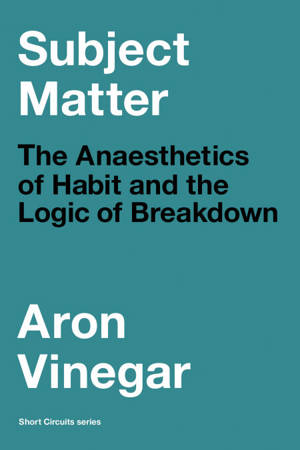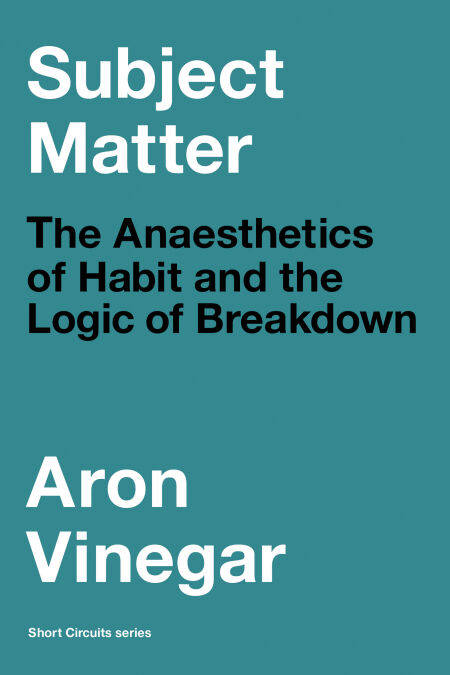
Bedankt voor het vertrouwen het afgelopen jaar! Om jou te bedanken bieden we GRATIS verzending (in België) aan op alles gedurende de hele maand januari.
- Afhalen na 1 uur in een winkel met voorraad
- In januari gratis thuislevering in België
- Ruim aanbod met 7 miljoen producten
Bedankt voor het vertrouwen het afgelopen jaar! Om jou te bedanken bieden we GRATIS verzending (in België) aan op alles gedurende de hele maand januari.
- Afhalen na 1 uur in een winkel met voorraad
- In januari gratis thuislevering in België
- Ruim aanbod met 7 miljoen producten
Zoeken
€ 29,52
+ 29 punten
Omschrijving
A theorization of habit that emphasizes its excessive and unsettling qualities rather than its mediating, adaptive, and stabilizing functions.
Subject Matter offers a bold counterpoint to prevalent conceptions of habit characterized by bodily fluidity and ease, as the stabilizing foundation of an emerging subjectivity, or, more negatively, as a numbing and deadening force. Instead of facilitating the coordination of action with goal and self with environment, habit appears here as a disruptively recursive operation with extreme ontological implications that are often more quotidian than exceptional. Vinegar theorizes habit’s more perturbing aspects, from repetition compulsion to kenosis to breakdown, through an encounter between Hegel’s philosophy (of habit), psychoanalytic dimensions of repetition, Tom McCarthy’s novel Remainder, and Omer Fast’s feature-length film interpretation of the novel.
Vinegar starts with the premise that habit is an “unhappy mediator,” a disturbance of the very medium and milieu that is constitutive of the subject. Subject Matter pays close attention to those aspects of habit that are usually considered deviations from, or potential threats to, habit proper and that generate a logic of breakdown: automaticity, mechanization, thingness, inertia, and fixity. By plotting a topology of habit’s unbearability through detailed accounts of its manifestation in writing, art, aesthetics, and visuality—and through an attentiveness to the unbalanced nonrelations between mediation and immediacy, being and having, fixity and fluidity, vanishing and overflowing, abbreviation and excess, beginning and ending—Vinegar exposes habit’s failure to mediate and inhabit. In doing so, he offers new and counterintuitive insights into how habit generates the unruly grounds it is supposed to settle, thus allowing us to ask how we might break down differently.
Subject Matter offers a bold counterpoint to prevalent conceptions of habit characterized by bodily fluidity and ease, as the stabilizing foundation of an emerging subjectivity, or, more negatively, as a numbing and deadening force. Instead of facilitating the coordination of action with goal and self with environment, habit appears here as a disruptively recursive operation with extreme ontological implications that are often more quotidian than exceptional. Vinegar theorizes habit’s more perturbing aspects, from repetition compulsion to kenosis to breakdown, through an encounter between Hegel’s philosophy (of habit), psychoanalytic dimensions of repetition, Tom McCarthy’s novel Remainder, and Omer Fast’s feature-length film interpretation of the novel.
Vinegar starts with the premise that habit is an “unhappy mediator,” a disturbance of the very medium and milieu that is constitutive of the subject. Subject Matter pays close attention to those aspects of habit that are usually considered deviations from, or potential threats to, habit proper and that generate a logic of breakdown: automaticity, mechanization, thingness, inertia, and fixity. By plotting a topology of habit’s unbearability through detailed accounts of its manifestation in writing, art, aesthetics, and visuality—and through an attentiveness to the unbalanced nonrelations between mediation and immediacy, being and having, fixity and fluidity, vanishing and overflowing, abbreviation and excess, beginning and ending—Vinegar exposes habit’s failure to mediate and inhabit. In doing so, he offers new and counterintuitive insights into how habit generates the unruly grounds it is supposed to settle, thus allowing us to ask how we might break down differently.
Specificaties
Betrokkenen
- Auteur(s):
- Uitgeverij:
Inhoud
- Aantal bladzijden:
- 216
- Taal:
- Engels
- Reeks:
Eigenschappen
- Productcode (EAN):
- 9780262375924
- Verschijningsdatum:
- 27/11/2023
- Uitvoering:
- E-book
- Beveiligd met:
- Adobe DRM
- Formaat:
- ePub

Alleen bij Standaard Boekhandel
+ 29 punten op je klantenkaart van Standaard Boekhandel
Beoordelingen
We publiceren alleen reviews die voldoen aan de voorwaarden voor reviews. Bekijk onze voorwaarden voor reviews.









